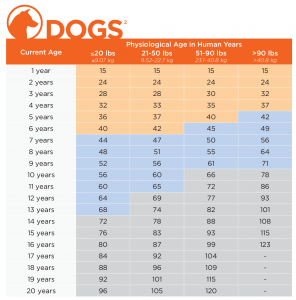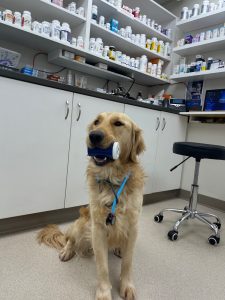We’re committed to providing comprehensive care for our canine patients throughout every stage of life. Here’s an overview of the recommendations and services we offer for each age range:
@ All Ages: Preventative Matters!
We offer a wide variety of preventatives intended to prevent infection from heartworm, fleas, and ticks. We recommend all our patient’s to be on preventatives year-round, and in most cases this is a much more cost effective solution than to treat the health problems they cause. Overall, flea, tick, and heartworm prevention should be an essential part of every dog owner’s routine healthcare regimen to keep their furry friends healthy and happy.
Brands we have in hospital include: Heartgard®, Nexgard®, Simparica Trio® & Inteceptor® Plus. Other brands can be purchased from our online pharmacy and shipped directly to you!


Puppies: The Proactive Approach
In your puppy’s first year, they will be seen several times by our veterinarians to ensure a smooth transition into your home. Some of the services we cover include overall wellness checks, core vaccinations, and fecal screenings.
Wellness Checks:
During these initial visits, we will cover general puppy/dog care such as nutrition, monthly parasite preventative care, nail care, etc.
Vaccinations:
- Rabies: In the state of Connecticut, it’s mandatory for all dogs over three months old to receive the Rabies vaccine. This vaccine is considered core for dogs, as it protects against a disease that can have devastating effects on the brain. Moreover, Rabies is zoonotic, meaning it can be transmitted to humans, underscoring the critical importance of keeping dogs vaccinated. A Rabies vaccine can be administered to any dog over the age of 12 weeks, where it is then valid for one year. Following initial vaccination, rabies boosters will then be administered every three years
- Distemper (DA2PP): Another crucial core vaccine for dogs is the “distemper” vaccine, which provides protection against four diseases: Distemper, Adenovirus, Parvovirus, and Parainfluenza virus. These illnesses can have fatal consequences if a dog is exposed to them, highlighting the necessity of the core vaccine status. According to the AVMA (American Veterinary Medical Association), puppies should receive three doses of the vaccine to ensure full protection. Subsequently, the vaccine is boosted one year after the initial dose and then administered every three years thereafter, similar to the rabies vaccine schedule.
- Leptospirosis: The leptospirosis vaccine for dogs protects against a bacterial infection caused by Leptospira bacteria. These bacteria are commonly found in water and soil, and dogs can become infected through contact with contaminated urine or water. Leptospirosis can lead to serious health issues in dogs, including kidney and liver damage, and it can also be transmitted to humans. The vaccine is considered a non-core vaccine, meaning it is recommended based on a dog’s lifestyle and risk factors. Dogs who spend time outdoors, in rural areas, or near bodies of water may be at higher risk of exposure and thus benefit from the vaccine. The leptospirosis vaccine is typically administered as an initial series of two doses, followed by annual boosters.
- Lyme: The Lyme vaccine provides protection against Lyme disease, which is caused by the bacterium Borrelia burgdorferi transmitted through the bite of infected ticks, primarily the deer tick. Lyme disease can lead to a range of health issues in dogs, including joint pain, lameness, fever, lethargy, and in severe cases, kidney damage. Similar to the leptospirosis vaccine, the Lyme vaccine is considered a non-core vaccine and is recommended based on a dog’s lifestyle and risk of exposure to ticks carrying the bacterium. Dogs who live in or visit areas where Lyme disease is prevalent or spend time in wooded or grassy areas where ticks are common may benefit from vaccination. The Lyme vaccine is typically administered as an initial series of two doses, followed by annual boosters.
- Influenza: The influenza vaccine protects against canine influenza virus (CIV), which is a highly contagious respiratory infection that affects dogs. The canine influenza vaccine is considered a non-core vaccine and is typically recommended for dogs at higher risk of exposure to the virus, such as those who frequently visit places where dogs congregate, such as boarding facilities, dog parks, or grooming salons. Similar to other vaccines, the influenza vaccine is administered as an initial series of two doses, followed by annual boosters.
- Bordetella: The Bordetella vaccine for dogs protects against Bordetella bronchiseptica, a bacterium commonly associated with kennel cough, a highly contagious respiratory infection in dogs. The Bordetella vaccine is considered a non-core vaccine and is typically recommended for dogs who are at higher risk of exposure to the bacterium, such as those who frequently interact with other dogs in group settings. At MAH, the Bordetella vaccine is administered orally, and is boostered once a year.
Fecal Screening:
It is recommended that all puppies receive at least one fecal screening test. The purpose of this test is to check for intestinal parasites, such as giardia, roundworm, tapeworm, and hookworm and whipworm.
Adult & Senior Dogs: Life-Long Wellness
Annual Physical Examination:
Every year it is critical that we cover everything from dental health, heart health, weight management, joint health, and nutritional management. Why? Remember that your pet’s health is accelerated, even more than the progression of our health.
Annual Tick Screening & Heartworm Testing:
We recommend annually testing our canine friends for the three most common tick borne diseases in our area (Lyme, Ehrlichia, Anaplasma) as well as Heartworm Disease. Here’s why:
- Tick Borne Diseases: Did you know that Connecticut is ranked as the 6th most prevalent state for tick borne diseases? Given how tick-saturated our area is, we encourage all patients to get tested once a year to make sure we have anegative status for these diseases. After all, the larva (smallest life stage) of a tick can be as small as a grain of sand– which makes them easy to miss on our pets. Once a tick feeds on your pet (through a bite)– they can transmit disease in as little as 3-6 hours for ehrlichia, or 12-48 hours for anaplasma and lyme disease. Once infected, tick borne diseases can cause symptoms such as fever, lethargy, muscle weakness, and even kidney disease. Testing pets for tick borne disease offers a very helpful diagnostic tool in case your pet begins to develop any of these symptoms, and having it annually helps determine how long they might have had the disease for.
- Heartworm Disease: Heartworm disease is transmitted via a parasitic worm called dirofilaria immitis, which is transferred through the bite of an infected mosquito. Once a mosquito feeds on a dog, the larvae of the heartworm migrate through the bloodstream and eventually settle in the heart, lungs, and blood vessels. Over time, they grow into adult worms, causing damage to these organs and interfering with their normal function. According to the American Heartworm Association, although heartworm is more common in warmer climates, there has been a significant rise in cases seen on the east coast, making heartworm testing crucial for all dogs.
Fecal Screening:
Dogs will be dogs. Their noses are often to the ground; they also occasionally pick up things off of the ground and eat them as well as lick their paws after going outside. Testing for common GI parasites is a must. In this test, our lab is looking for the most common GI parasites (giardia, roundworm, hookworm, whipworm, coccidia, tapeworm)
Annual Bloodwork & Urinalysis:
We all can appreciate the concept of “An Ounce of Prevention Worth A Pound of Cure.” There is absolutely no better way of keeping track of your dog’s internal body health than by running routine annual blood work on your dog and routine urine screening. By evaluating these two body fluids, we can keep a close eye on your dog’s overall health and address any changes as they age. For adult dogs, our blood work consists of a full chemistry panel and complete blood count panel. Urinalysis includes a physical, chemical and microscopic analysis of urine.
